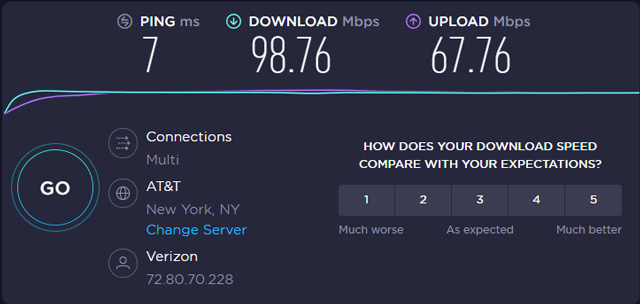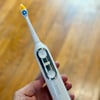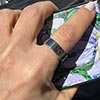Now that you and your family are all working and going to school at home, your internet speed may feel slow — video could be stuttering or web pages could be taking forever to load. Or maybe you're looking to figure out what internet package you need from your provider so you don't spend more money than necessary. What works for one home isn't the same for everyone, so here's how to determine what "good WiFi" means for you.
How much internet bandwidth you need going into your home (or what WiFi network speed you need inside your home) will depend entirely on what you are doing online – e.g. playing online games, making video calls, streaming movies, using a smart doorbell, or just checking email – and how many people and devices are actively using your home WiFi simultaneously.
Most households with 2-3 people will need at least 25Mbps under normal circumstances. However, with more people working and playing at home, attending video classes and meetings, as well as enjoying streaming video and gaming, 25Mbps may not be enough. And, there may be devices using your internet in the background that could be slowing things down. For instance, WiFi cameras (security cameras, baby monitors, video doorbells), streaming music services, and smart home devices, like thermostats and smart lights, all eat into the amount of WiFi available for other activities. And if you're looking to stream movies and shows in 4K, that's a whole different ballgame.
Another factor you need to take into consideration is that your internet package reflects the maximum speed your WiFi can attain. When you sign up for service, your provider always claims it's for speeds of "up to" 25Mbps or 100Mbps. Rarely will you achieve the maximum that you’re paying for. So be sure to check your actual connection speed on sites like Speedtest.net at various times throughout the day to get an accurate picture of your true speed. (And, consult our tips on how to get better WiFi with the speed you do have.)

Armed with your actual WiFi speed, you can use the chart below to add up the speed you'll need to comfortably use WiFi without video stuttering, gaming lags or internet slowdowns. Keep in mind that you'll likely not be engaged in all of the activities simultaneously, so add up the maximum load you reasonably think your WiFi will need to handle. For instance, with my family of five, I need enough for two HD video streams, regular online gaming (my son is a Fortnite fanatic), video-heavy web browsing and several smart home devices – your requirements may differ.
Minimum Bandwidth Requirements |
||||||
| up to 1.5Mbps | 1.5-2Mbps | 2-3Mbps | 3-5Mbps | 5-12Mbps | 25+ Mbps | |
| Streaming video | low-quality video | standard definition video | HD video, live TV | 4K video or HD video with HDR | ||
| Video conferencing | standard definition video calls | HD video calls, group video calls | ||||
| Smart home video devices | low frame rate, standard definition security cameras | video doorbells, standard definition security cameras | ||||
| Gaming | basic online gaming | regular online gaming (Fortnite) | HD gaming at high frame rates, gaming streaming services | |||
| Web browsing/ computer work | email and text-heavy web browsing | regular web browsing | video-heavy web browsing, downloading large files (slowly) | downloading large files (quickly) | ||
| Streaming Audio | low-quality audio streaming | streaming music services | ||||
[Image credit:devices with wireless signals via BigStockPhoto, screenshot via Techlicious/Speedtest.net]















From Rich Moser on April 13, 2020 :: 3:38 pm
I sure hope at some point you write an objective article about the health effects of wifi on people. Every article on wifi should have reasonable advice on how to stay healthy by keeping the devices a certain distance from your various body parts, using them for only certain amounts of time, and how to turn off the irradiation when you’re not using it. Most Americans are clueless about this due to industry greed and the revolving door between them and the government’s regulatory agencies. It is well established by now that overexposure to these microwaves will do substantial harm or cause death.
Reply
From Josh Kirschner on April 13, 2020 :: 5:31 pm
Hi Rich,
The evidence on this subject (and it has been studied extensively across the globe in thousands of studies) leans strongly towards there being no health effects from electromagnetic radiation, including the frequencies used for WiFi. This is too complex a subject to cover in these comments, but there are numerous world health agencies and organizations that provide their perspective:
https://www.cancer.org/cancer/cancer-causes/radiation-exposure/radiofrequency-radiation.html
https://www.who.int/peh-emf/publications/facts/fs304/en/
https://www.who.int/en/news-room/fact-sheets/detail/electromagnetic-fields-and-public-health-mobile-phones
https://www.mayoclinic.org/healthy-lifestyle/adult-health/expert-answers/cell-phones-and-cancer/faq-20057798
https://www.cdc.gov/nceh/radiation/cell_phones._faq.html
http://hps.org/documents/Mobile_Telephone_Fact_Sheet_update_May_2010.pdf
This IARC report was heavily reported and referenced when it came out in 2011 for classifying Radiofrequency Electromagnetic Fields (cellphone frequencies) as “possibly carcinogenic to humans”. However, that is based on a determination that “[the evidence]... overall evaluated as being limited among users of wireless telephones for glioma and acoustic neuroma, and inadequate to draw conclusions for other types of cancers. The evidence from the occupational and environmental exposures mentioned above was similarly judged inadequate.” And “limited” evidence, per the IARC definition, simply means “a positive association has been observed between exposure to the agent and cancer for which a causal interpretation is considered by the Working Group to be credible, but chance, bias or confounding could not be ruled out with reasonable confidence.” https://www.iarc.fr/wp-content/uploads/2018/07/pr208_E.pdf
Reply
From Rich Moser on April 13, 2020 :: 5:57 pm
Hello, Thanks for responding, although from your statement it would seem you’ve taken a pro-industry position, which is not surprising given how you make a living. Let’s just say for now that there is plenty of controversy on this subject, and I will begin assembling some of the opposing information to send you. Not that I expect you to change your POV, but I hope at least you will post it for fairness and transparency. I do have a degree in biology and a health background, so I will start by saying it’s well-established that EMF radiation causes oxygen deprivation in cells, and that overexposure to cell phone radiation is leading to brain cancers, the manufacturers are covering it up and hiding the warnings on page 45 of their legal statements on our phones. And those lawsuits are just beginning. 5G has not been tested for health in any way, although it seems to target oxygen availability in cells. Stay tuned!
Reply
From Josh Kirschner on April 13, 2020 :: 6:47 pm
My position is based on the current science, and I’ve linked to numerous scientific authorities (all the main ones, actually) that support that view. There are thousands of studies out there on this topic, with huge variance in quality and associated results. And while there is considerable controversy, no health effects are “well-established”. To the contrary, health effects in humans (and animals) are “not established”. At best, they are suggested or, in some cases, strongly contradicted.
If the scientific view shifts based on new studies or evidence, we absolutely will report it and change our recommendations. We have no dog in this race other than to provide the best information we can to our readers. We’ve warned of tech health risks in the past and we’ll do it again when the science warrants it.